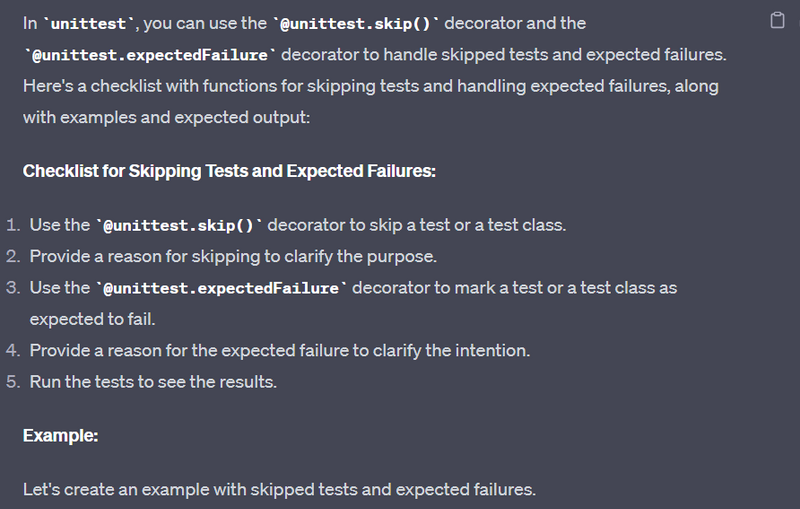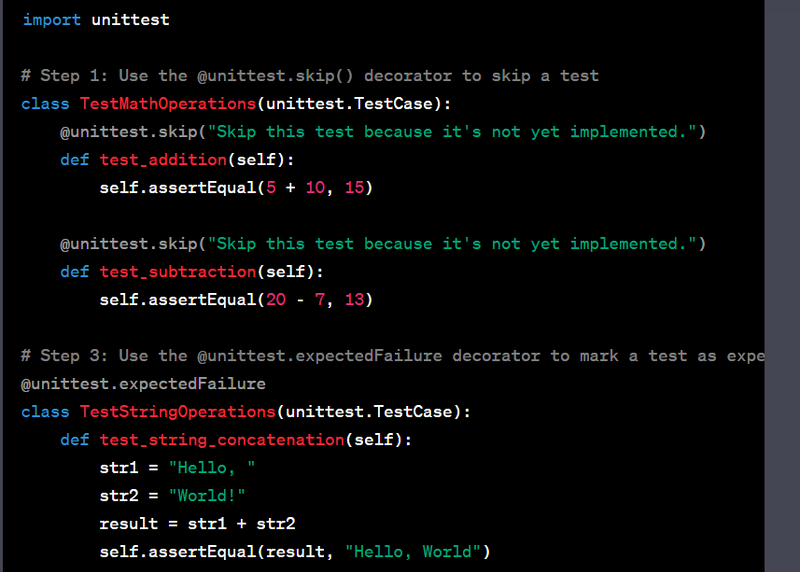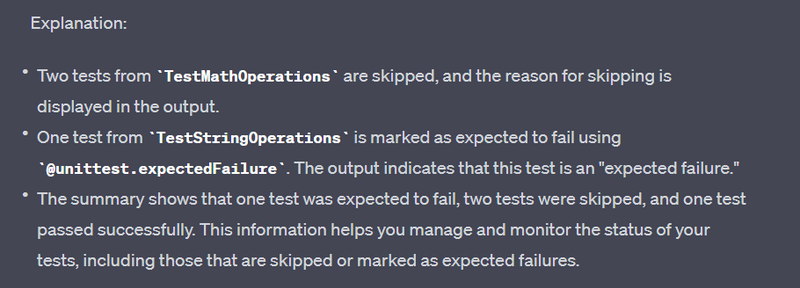Unittest supports skipping individual test methods and even whole classes of tests. In addition, it supports marking a test as an “expected failure,” a test that is broken and will fail, but shouldn’t be counted as a failure on a TestResult.
Skipping a test is simply a matter of using the skip() decorator or one of its conditional variants.
Basic skipping looks like this:
class MyTestCase(unittest.TestCase):
@unittest.skip("demonstrating skipping")
def test_nothing(self):
self.fail("shouldn't happen")
@unittest.skipIf(mylib.__version__ < (1, 3),
"not supported in this library version")
def test_format(self):
# Tests that work for only a certain version of the library.
pass
@unittest.skipUnless(sys.platform.startswith("win"), "requires Windows")
def test_windows_support(self):
# windows specific testing code
pass
This is the output of running the example above in verbose mode:
test_format (__main__.MyTestCase) ... skipped 'not supported in this library version'
test_nothing (__main__.MyTestCase) ... skipped 'demonstrating skipping'
test_windows_support (__main__.MyTestCase) ... skipped 'requires Windows'
Ran 3 tests in 0.005s
OK (skipped=3)
Classes can be skipped just like methods:
@unittest.skip("showing class skipping")
class MySkippedTestCase(unittest.TestCase):
def test_not_run(self):
pass
TestCase.setUp() can also skip the test. This is useful when a resource that needs to be set up is not available.
Expected failures use the expectedFailure() decorator.
class ExpectedFailureTestCase(unittest.TestCase):
@unittest.expectedFailure
def test_fail(self):
self.assertEqual(1, 0, "broken")
It’s easy to roll your own skipping decorators by making a decorator that calls skip() on the test when it wants it to be skipped. This decorator skips the test unless the passed object has a certain attribute:
def skipUnlessHasattr(obj, attr):
if hasattr(obj, attr):
return lambda func: func
return unittest.skip("{!r} doesn't have {!r}".format(obj, attr))
The following decorators implement test skipping and expected failures:
unittest.skip(reason)
Unconditionally skip the decorated test. reason should describe why the test is being skipped.
unittest.skipIf(condition, reason)
Skip the decorated test if condition is true.
unittest.skipUnless(condition, reason)
Skip the decorated test unless condition is true.
unittest.expectedFailure()
Mark the test as an expected failure. If the test fails when run, the test is not counted as a failure.
exception unittest.SkipTest(reason)
This exception is raised to skip a test.
Usually you can use TestCase.skipTest() or one of the skipping decorators instead of raising this directly.
Skipped tests will not have setUp() or tearDown() run around them. Skipped classes will not have setUpClass() or tearDownClass() run.
Expected Output:
When you run the tests, the output will show which tests were skipped and which ones were expected to fail. Here's an example of the expected output:






Top comments (0)